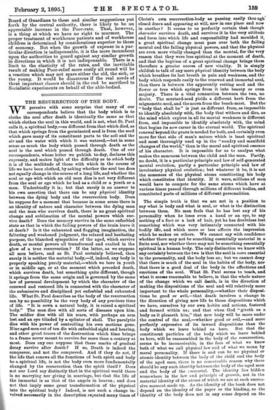THE NEW CIRCULAR TO GUARDIANS.
SO much has been said of late about altering the law dealing with the relief of the poor that it is a pleasant surprise to find the Local Government Board treating workhouse administration as a matter that can be greatly improved, even though the law remains what it is. That there is need for amendment in this way we have no doubt, and one of the reasons which have led us to deprecate fresh legislation is the conviction that until the full benefit of the existing law has been secured, it is useless to try to amend it. Any fresh statute would be subject to the same drawback as the original Act. That drawback is the frequent ignorance or incapacity or short- sightedness of the authorities to whom the execution of the law is entrusted. Sanguine people think that the changes which the Local Government Act of last Session has made in the method of election will greatly improve the quality of the Guardians. We wish we could share this belief. Our own impression is just the contrary. The exclusion of the ex officio element, and the abolition of plural voting, are more likely to lead to changes which have not been properly thought out, and experiments undertaken in a wrong temper and with no reasonable prospect of success. At all events, it is better that the new Guardians should work under a law with which many of them will be familiar, while the Local Government Board will have it at its fingers'-ends, than under a new Act, as to the meaning of which—if it were at all like other recent Acts—neither officials nor Judges would be agreed. It is quite right, therefore, that the Local Govern- ment Board should state, for the information of Boards of Guardians, what it is at present in their power to do, and on what principles they should proceed in doing it.
There is no question as to the substantial accuracy of the distinction drawn in the Circular between the inmates of workhouses to-day, and the inmates of workhouses sixty years ago. At the earlier date, workhouses were " provided chiefly for the relief of the able-bodied, and their administration was therefore intentionally deterrent." Now " the sick, the aged, and the infirm greatly prepon- derate, and this has led to a change in the spirit of the administration." It may be pointed out, indeed, that this alteration in the composition of the workhouse popu- lation is in a great measure the result of the Poor-law Amendment Act ; and if the doctrines now often preached about the unemployed should be generally accepted, workhouses would again be largely recruited. from the able-bodied class. It has for the last sixty years been the object of all Poor-law administration to make the position of the able-bodied man, who is unable to main- tain himself, sufficiently distasteful to insure that he will not ordinarily remain in it a moment longer than he can help. It is now loudly asserted, as regards the unemployed outside the workhouse, that they have a claim not to relief merely, but to work, and that as a consequence of this, their work must be paid for at the same rate as the same class of labourer can obtain in the open market. Not to mention the many diffi- culties in the way of finding work of the variety demanded by suoh a rule as this, its first and most obvious effect would be to remove every inducement to getting back to ordinary labour. Why should a man who is paid by the State or the municipality the same wages that he has been accustomed to receive from a private employer, be in any hurry to exchange a certainty for a chance ? In precisely the same way, if workhouses are made as pleasant to live in as a man's own cottage, why should their inmates desire to leave them ? We may wish that human nature were different, and that we might make an able-bodied man perfectly comfortable without lessening his sense of independence, or inducing him to stay in the workhouse one day longer than he is forced. But human nature being what it is, the sense of independence, which keeps able-bodied men out of the workhouse, is the creation of the treatment they receive in the workhouse.
There is no need, however, to push this argument any further than necessity requires. There have, indeed, been those who have seen danger in making the workhouse too comfortable even for those who are not able-bodied. They argue that if men once feel that they will be comfort- ably looked after in sickness and in old age, they will no longer have any inducement to make their own provision against these contingencies. We think that this argument leaves out of sight the difficulty that youth, and even middle age, has in believing that it will ever be old. Among working men, this difficulty assumes its most acute form, because a man is at his best as a wage-earner very early in life. Tell a man of twenty-five that, if he comes upon the parish at sixty-five, he will be treated in such and such a fashion, and it will not, as we believe, make the slightest difference to his action whether that fashion be kindly or severe. His imagination does not carry him so far. He argues that he may never live to be old, or that if he does so, something will have turned up in the interval. The prospect of sickness seems to touch him still less. It is either met by a benefit or trade society, or by a hospital to which he contributes nothing. If an uncertain future has no terrors for him in his own person, still less is it likely to have them in the persons of his children. There is no real danger therefore in giving a different treatment to the two extremes of life from that which we give to the middle period. We may make the aged and the sick comfortable and the life of workhouse children as cheerful as we can, without incurring any appreciable risk of pauperising able-bodied men.
It is to this end that the new Circular is directed. The Guardians are directed to subdivide the inmates of work- houses, having regard to their moral character or be- haviour, or to their previous habits. It is obvious that if this is generally done, one of the worst annoyances associated with workhouses in the minds of decent people will be greatly mitigated. The poor commonly esteem it a conspicuous merit in those of their own class that they "keep themselves to themselves." But in a workhouse without classification this is impossible. The old man or the old woman who has always led a quiet and respectable life, is forced to associate with those whose lives have been neither the one nor the other. We inflict on poverty the penalty commonly associated with a badly managed gaol. There is one kind of classification upon which the Local Govern- ment Board might properly insist with greater urgency than they do. " The proper care of imbeciles retained in workhouses " is said to deserve the special attention of the Guardians. No doubt it does ; but except where the imbecility is of the mildest possible type, this care should be bestowed elsewhere than in the workhouse. Association with idiots must in many cases neutralise any improve- ments that may be introduced into workhouses ; and without some considerable extension of the Asylum system, association with idiots will be the lot of a good many indoor paupers. With reference to children in workhouses, the Circular notes with satisfaction to what a large extent they are sent out for education to public elementary schools, and makes the further suggestion that, where possible, they should be allowed to attend Sunday-schools of their own denomination. It is of the utmost importance that workhouse children should be kept as clear as possible of any permanent association with pauperism, and attendance at an outside school is one of the most certain methods of effecting this. A large part of the Circular is devoted to the treatment of the sick. The Guardians are directed to pay strict atten- tion to the directions of the medical officer, and wherever it is anyway practicable, to employ none but trained nurses and assistant nurses. In this respect there has of late years been a great and steady improvement, but there are still many workhouses in which the pauper nurse is not wholly unknown. Whatever may once have been the case, there is no longer, it would seem, any justification for this practice in the difficulty of obtaining trained nurses. Their number has greatly increased, and, in the opinion of the Local Government Board, is now fully equal to the demand.
It will be seen that if proper attention is paid by a
Board of Guardians to these and similar suggestions put forth by the central authority, there is likely to be an appreciable increase in the Poor-rate. That, however, is a thing at which we have no right to murmur. The proper treatment of workhouse patients and of workhouse children is determined by considerations superior to those of economy. But when the growth of expense in a par- ticular direction is indispensable, it is the more incumbent upon the authorities to guard against any similar growth in directions in which it is not indispensable. There is a limit to the elasticity of the rates, and the inevitable result of making Poor-relief more costly all round will be a reaction which may not spare either the old, the sick, or the young. It would be disastrous if the real needs of these important classes should in the end be sacrificed to Socialistic experiments on behalf of the able-bodied.



































 Previous page
Previous page